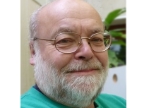
Bob Conduct
Bob Conduct was born in Evesham, Worcestershire, and attended Saltley School in Birmingham, where, alongside a basically scientific education, he acquired a working knowledge of stage lighting and sound. The latter, coupled with an interest in radio, led him to read Electronic Engineering at Sheffield University, followed in 1963 by an appointment to BBC Radio as a Technical Operator in London Control Room.
1963 – Completed TO course at Wood Norton but – apart from sitting-in on Beatles and Roy Orbison recording sessions – realised that BH Control Room could not offer the degree of musical job satisfaction he sought. Transferred to ‘Outside Studios’ department based at the Playhouse Theatre Charing Cross, providing engineering support for the live lunchtime pop music shows broadcast daily from that theatre. and occasionally working in all of BBC Radio’s dozen or so music recording studios in London and at Maida Vale.
1968 – Became an SM/sound mixer working extensively “at the sharper end of pop” (the Beeb’s expression), specialising in sessions for John Peel and Sounds Of The 70s, recording and mixing virtually all the top bands in the business at that time – Beefheart, Bonzos, Caravan, Curved Air, Deep Purple, Elton John, Eno, Fleetwood Mac, Family, Fairports, Fleetwood Mac, Free, Genesis, Gentle Giant, Hawkwind, Hendrix, Increds, Jethro Tull, Joan Armatrading, Kinks, Lindisfarne, Bob Marley, Marmalade, Nice, Osibisa, Pretty Things, Procol Harum, Rod Stewart, Soft Machine, Slade, Steeleye, Supertramp, Thin Lizzy and many many more – including (for contrast!) Cliff Richard, The Shadows, Gene Pitney and even Mrs Mills and The Wombles!!
1977 – Family reasons triggered a very reluctant move from the unsocial hours of a Sound Mixer into BBC ‘management’ as a production servicing manager, based in Ariel House, Charlotte Street, servicing the total music requirements of Radios 1 & 2 and working on the technical re-equipping of six of the BBC’s London music studios including the installation of Solid State Logic consoles. Joined the development team of the first digital console – the Neve DSP, and also, with a colleague, designed what were intended as the BBC’s first direct-to-air broadcast studios for the proposed Broadcasting House reconstruction.
1986 – Emerged from yet another BBC reorganisation, moved office to Maida Vale and additionally took on the allocation of R1 & R2 transmission staff (now over 60 persons in total). Continued also to work on the ongoing modernisation of the music studios, culminating in design work on the Beeb’s justly famed ‘Rock Complex’ – built on the site of the original Maida Vale Studios 4 & 5.
1990 – Moved office to Broadcasting House and now, with a colleague, servicing the total programme making and transmission requirements of Radios 1 & 2
1994 – and another office move later – became an Accounts Manager in the new Resources Directorate, responsible for Radios 1 & 2 (in London) and Religion (in Manchester). (You couldn’t make it up….!!). Didn’t like it one bit, so……
1995 – took advantage of yet another BBC reorganisation to take early retirement, becoming a freelance technical consultant in radio and audio.
Commissioned to design and specify a 5-studio music/drama/broadcast complex for an independent production company in Central London; had name submitted as potential technical advisor to Paul McCartney’s Liverpool Institute of Performing Arts (LIPA); commissioned to specify a “state-of-the-art” demonstration music studio for a major UK recording console manufacturer; had name submitted as potential technical advisor to the redevelopment of EMI Elstree Film Studios; provided technical advice to the International Maritime Organisation and restored many unintelligible recordings for them; designed and specified a radio transmission studio and a multitrack music recording studio for a college; designed and specified a 5 studio complex for a recording group in Sussex.
Was persuaded to join the Executive Committee of The Institute Of Broadcast Sound as EC Secretary.
2000. Gradually withdrew from the design and specification side of the Broadcast & Recording industries, but continued as EC Secretary of the IBS.
2001. Accepted several commissions for custom-built furniture, including a new workspace/office for a prominent local TV Director – and (for something completely different) built a complete pottery studio for a local artist.
2002. Built a second pottery studio. Became involved with organizing seminars for Broadcast sound staff at BBC Training & Development Centre and at The National Film & TV School. Invited to become Radio Advisor to the National Museum of Film, Photography & TV in Bradford.
2003. Really retired to progress other lifelong interests including brewing – and drinking – fine ale, but remaining as the Exec Committee Secretary of what had now evolved into the Institute of Professional Sound.
2020. Decided that, after 25 years of being EC Secretary, during which time I minuted over 250 Committee meetings, chaired many of them under six IPS Chair incumbents, assisted the EC through numerous Mem & Arts rule changes, as well as.the change of name to the Institute of Professional Sound, it really was time to ‘step down’.
I am extremely honoured and pleased to accept this award of a Fellowship from the Executive Committee of the Institute. I will, of course, be maintaining a keen interest in the future directions in which the Institute is steered – by its Committee, by its Members and by the Sound Industry.
Bob Conduct FIPS
